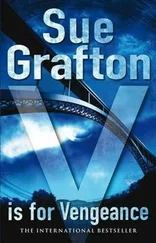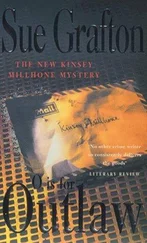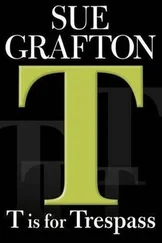"She won't be back until after three, but maybe I can help. What's the scoop?"
"I was going to ask her to call the county jail and have someone check the jail release forms for a fellow named Curtis McIntyre."
"Wait a minute. Let me grab a pencil. That was McIntyre?"
"Right. He's an informant set to testify on a case for Lonnie Kingman. I need to know if he was incarcerated on May twenty-first, five years ago, which is when he claims he talked to the defendant. I can get the information by subpoena, but it's probably just a wild-goose chase and I hate to go to all the trouble."
"Shouldn't be hard to check. I'll call you back when I've got it, but it may take a while. I hope you're not in any crashing hurry."
"The sooner the better."
"Ain't that always the way?" Lieutenant Becker said.
Once I hung up the phone, I sat and thought about the situation, wondering if there was a quicker means of verifying the information. I could certainly wait until midafternoon, but it would prey on my mind. David Barney's call had left me feeling restless and out of sorts. I was reluctant to waste time checking out what was probably pure fabrication on his part. On the other hand, Lonnie was counting on Curtis McIntyre's testimony. If Curtis McIntyre was lying, we were sunk, especially with Morley's investigation coming unraveled at the same time. This was my first job for Lonnie. I could hardly afford to get fired again.
In my head, I reran the conversation I'd had with Curtis at the jail. In his account, he'd intercepted David Barney in the corridor just outside the courtroom on the day he was acquitted. I didn't think I could count on Barney's attorney, Herb Foss, to corroborate Curtis's claim, but could there have been another witness to their encounter? Just the countless reporters with their Minicams and mikes.
I grabbed my jacket and my shoulder bag. I left the office and dog-trotted the two blocks to the side street where I'd finally managed to squeeze my car into a bare stretch of curb. I took Capilla Boulevard across town, through the heart of the commercial district, and headed up the big hill on the far side of the freeway.
KEST-TV was located just this side of the summit. From the bluff where the station sat, there was a 180-degree living mural of the city of Santa Teresa: mountains on one side, the Pacific Ocean on the other. There was parking for about fifty cars and I pulled into a spot designated for visitors. I got out of the car and paused for a moment to take in the view. The wind was buffeting the dry grasses along the hill. In the distance, the pale ocean stretched to the horizon, looking flat and oddly shallow.
I remembered the story I'd once heard from a marine archaeologist. He told me there was evidence of primitive offshore villages, underwater now, located at the mouths of ancient sloughs or arroyos. Over the years, the sea had offered up broken vessels, mortars, abalone spangles, and other artifacts, probably eroding from former cemeteries and middens along the now-submerged beach. In legend, the Chumash Indians recount a time when the sea subsided and remained that way for hours. A house was exposed at the far reaches of the low tide… a mile out, or two miles… this miraculous shanty. People gathered on the beaches, murmuring with amazement. The waters receded further and a second house appeared, but the witnesses were too frightened to approach. Gradually the waters returned and the two structures vanished, covered by the slow swell of the incoming tide.
There was something eerie about the tale, Holocene ghosts offering up this momentary vision of a tribal site lost from view. Sometimes I wondered if I'd have dared venture out across that stretch of exposed channel. Perhaps half a mile out, it plunged downward like the sides of a mountain, underwater cliffs tumbling ever deeper to the canyon below. I pictured the sediment on the ocean bottom, glistening, dead gray from the lack of light, cobbled and pockmarked with all its blunt and stony treasures. Time covers the truth, leaving scarcely a ripple on the surface to suggest all the plains and valleys that lie below. Even now, dealing with a six-year-old murder, much was hidden, much submerged. I was left to gather artifacts washed up like rubble on the shores of the present, uneasy about the treasures, undiscovered, lying just out of reach.
I turned and went into the station. The building itself was a one-story stucco structure, painted a plain sand color, bristling with assorted antennae. I went into the lobby with its pale blue carpeting, furnished with the kind of "Danish Modern" furniture an affluent college student might rent for a semester. Christmas decorations were just going up: an artificial tree in one corner, boxes of ornaments stacked in a chair. On the wall to my right, numerous broadcast awards were mounted like bowling trophies. A color television was tuned to a morning game show, the gist of which seemed to be identifying a series of celebrities whose first names were Andy.
The receptionist was a pretty girl with long dark hair and vivid makeup. The name on the placard read Tanya Alvarez. "Rooney!" she called, her eyes pinned to the set. I turned and looked at the picture. "Andy Rooney" was correct and the audience was applauding. The next clue came up and she said, "Oh, shoot, who is that? What's-his-face? Andy Warhol!" Right again, and she flushed with pleasure. She looked over at me. "I could make a fortune on that show, except probably the day I got on it'd be some category I never heard of. Blowfish, or exotic plants. Can I help you?"
"I'm not sure. I'd like to look at some five-year-old news footage, if you have it."
"Something we taped?"
"That's what I'm assuming. This was the verdict on a local murder trial and I'm pretty sure you'd have covered it."
"Hang on a minute and I'll see if somebody back there can help you."
She rang through to 'somebody' in the bowels of the building, briefly describing the nature of my quest. "Leland'll be out in five minutes," she said.
I thanked her and spent the mandatory waiting period wandering from the front entrance, which looked out onto the parking lot, to the sliding glass doors on the far side of the reception area, which looked out onto a wide concrete patio furnished with molded white plastic chairs. A three-dimensional view of the city wrapped around the patio like a screen. I could imagine the station employees having lunch out in the hot sun-women with cotton skirts discreetly pulled up, men without shirts. A big dish antenna dominated the view. The air looked hazy from up here…
"I'm Leland. What can I do for you?"
The fellow who'd appeared through the doorway behind me was in his late twenties and had to be a hundred pounds overweight. He had a mop of curly brown hair surrounding a baby face, with wire-rimmed glasses, clear blue eyes, flushed cheeks, and no facial hair. With a name like Leland, he was doomed. He looked like the kind of kid who'd been tormented by his schoolmates since the first day of school, too bright and too big to avoid the involuntary cruelties of other middle-class children.
I introduced myself and we shook hands. I explained the situation as succinctly as possible. "What occurred to me was that with local reporters present on the day Barney was acquitted, there were probably Mini-cams rolling as he emerged from the courtroom."
"Okay," he said.
" 'Okay' wasn't really the response I was looking for, Leland. I was hoping you had a way to go back and check the old news tapes."
Leland gave me a blank look. I wish a P.I.'s job were half as easy as they make it look on television. I've never opened a dead bolt with a pass of my credit card. I can't even force mine into a doorjamb without breaking it off. And what's it supposed to do once you slide it in there? Most of the latch bolts I've seen, the slanted angle is on the inside so it's not as though you could slip a credit card along the face of it and force the latch to move back. And where the angle faces the outside, the strike plate resists the insertion of even the most flexible object. Leland seemed to be taking the same implacable position.
Читать дальше











